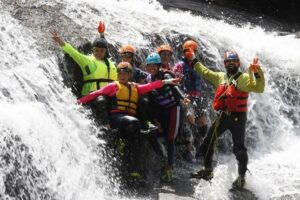Wilderness Sports Adventures – Survival and Skills in Extreme Conditions
Job Overview

Wilderness Sports Adventures – Survival and Skills in Extreme Conditions
Wilderness Sports Adventures – Survival and Skills in Extreme Conditions
Adventure and wild sports give athletes the opportunity to learn and hone key skills in an environment that fosters learning, development and creativity, just as melbet.bj gives sports fans the opportunity to bet on sports. In addition, these sports teach participants independence and self-confidence, which increases motivation to participate.
A Pre-Participation Examination (PPE) is often required prior to participating in wilderness sports, similar to the PPE conducted for traditional sports, but there may be some key differences.
Preparation is Key
Before heading out into the wilderness, it is crucial that you are equipped with appropriate gear. Furthermore, basic survival skills should also be acquired: these may include first aid, navigation, building shelters and gathering food and purifying water purification systems. Furthermore, knowledge of local wildlife such as their habits and habitats helps you anticipate their behavior, which reduces human-wildlife encounters.
Attitude is of equal importance during wilderness adventures. Believe in yourself and your abilities and you will be able to overcome any challenges along your journey.
Finaly, it is essential to carry the appropriate medical and emergency equipment. This includes having a first aid kit stocked with adhesive bandages, sterile gauze pads, tweezers, scissors and pain-relieving medication as well as consulting your physician regarding chronic health conditions such as heart disease (which might need EKG or stress tests), pulmonary diseases or digestive conditions that require colonoscopy procedures or special diet plans; see eForm 16.1 as an example of such forms.
Be Prepared
When planning a wilderness expedition, take time to research its environment and identify any wildlife or environmental risks. Also learn basic wilderness first aid skills so you can treat minor injuries or illnesses on your journey.
Know and abide by your limits – how far or cold you can hike for, how long a night sleep might last etc – before setting out on any journey. Additionally, learning how to signal for help during an emergency will enable search and rescue personnel to quickly locate you in case they’re needed.
Our hunter-gatherer ancestors had sophisticated classification systems for plants, animals and natural resources. Understanding how each organism inter-related was essential to their survival skills; this knowledge enabled them to utilize nature as a food source, shelter provider and clothing source. Being able to build fire can also play a vital role in keeping us alive in wilderness environments by warming bodies and equipment while boiling water for drinking and cooking purposes as well as offering psychological comfort during difficult times.
Know Your Limits
People love teaming up for incredible wilderness adventures – from scaling Half Dome in Yosemite to whitewater-rafting down the Grand Canyon – whether to seek transformative personal growth or check off bucket list items. However, without proper knowledge or preparation these adventures could put your life in jeopardy.
Take this weekend course with an experienced survival instructor to develop the essential survival skills you’ll need in the wild, such as building emergency shelters, making fire using both modern and primitive techniques, navigation using maps and compasses, finding and purifying water and more.
Brain power is key for survival; you must maintain a positive attitude and unshakeable self-belief during any wilderness adventure you undertake. Maintaining motivation will enable you to overcome any hardship and emerge stronger from the wilderness. As well as encouraging self-reliance, the University’s Diversity, Equity and Inclusion Plan outlines a strategy for “balancing traditional actors, places, and events with those from marginalized populations to convey an inclusive wilderness narrative” (Brune 2021). This can mean including race and gender equity into interpretational materials that explore iconic natural landscapes, like Yosemite National Park where John Muir was an icon of conservation, Ansel Adams an acclaimed photographer, but where Buffalo Soldiers of the 9th and 10th Cavalry served during the American Civil War.
Be Self-Reliant
Your brain is your greatest survival asset in wilderness situations. Your knowledge of outdoor skills such as how to spark a fire from sticks or build shelter in deep snow could save your life in times of hunger and exposure.
Our hunter-gatherer ancestors utilized basic science knowledge to classify plants and animals, understand their habitats, and use this understanding to survive. It should remain an integral component of survival skills that you should continue honing today.
Wilderness sports and adventures differ from traditional athletic events primarily by being unregulated, noncompetitive events which typically do not involve team participation. Preparticipation evaluation (PPE) may be particularly vital to this population because an inexperienced provider may be less likely to conduct a comprehensive analysis of chronic health conditions. See eForm 16.1 for a simplified health history form that may assist providers in providing PPE for wilderness sports and adventure participants, including optimizing chronic health conditions as well as reviewing for any adverse environmental influences that might worsen them.
Be Positive
Many survival manuals and courses stress the importance of adopting a positive outlook and never giving up. Belief in yourself and your skills is the best way to combat feelings of loneliness, fatigue, hunger, cold/heat discomfort or fear; all are common factors when in the wilderness survival situation; being prepared and having proper training can help withstand these feelings and conserve energy so there will be enough left over in the end for survival.
Systemically excluded people often hold differing perspectives about and values for wilderness (Goodrid 2018; Graham 2020). Land dispossession, slavery and intergenerational trauma may affect outdoor recreational experiences like camping, hiking and fishing (Dietsch et al 2021).
Wilderness communicators possess incredible influence over public perceptions of wilderness and its attributes. They determine who is included or excluded from stories about it, whether people with disabilities are seen as victims of nature rather than contributing tenaciously, creatively to society, and which historical events receive prominence.
- Total Jobs 349 Jobs
- Category Nafasi za Ajira
- Location Tanzania


